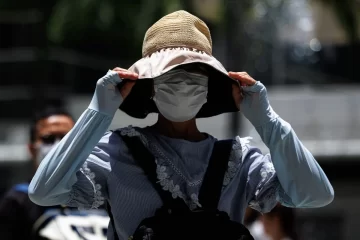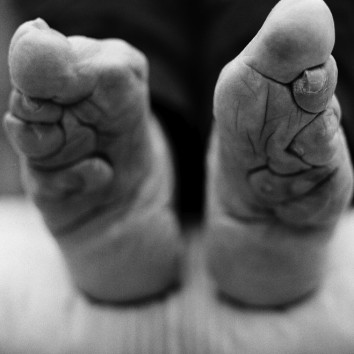
How extreme heat can affect your mental health and the best ways to cope
— August 15, 2023From feeling anxious and frustrated to irritable and even aggressive, extreme heat can affect our mental health in many ways

July was Hong Kong’s hottest month on record, with 21 “very hot days” when the daily maximum temperature reached 33 degrees Celsius (91 degrees Fahrenheit) or above.
While the physical discomfort of such heat is undeniable, research suggests that these conditions can put pressure on our psychological well-being, too.
“People may be uncomfortable, which makes them irritable, and we see an increase in frustration and anger,” says Hong Kong-based clinical psychologist Dr Cindy Chan. “We see more impulsive behaviour – people may crave food, or their addictions come out.”
Research has shown that there is a correlation between increasing temperatures and various mental health problems, including mental exhaustion, hostility, bipolar disorder, schizophrenia and higher suicide rates.
The reasons for this are not yet understood, but scientists are working to uncover whether heat can cause changes in the brain that lead to these effects.
“There is some speculation that an increase in temperatures may influence the serotonin level in the brain, so a person may develop increased depressive mood, anxiety, more unstable emotions or may become more impulsive. But more research needs to be done,” Chan says.
Serotonin is a chemical that carries messages between nerve cells in the brain and body and plays a role in functions such as mood, sleep, digestion, nausea, wound healing, bone health and sexual desire.Dehydration is a major concern. It can cause a decrease in blood volume, which leads to a drop in blood pressure and blood flow. This is because blood is composed of over 50 per cent water. When there is insufficient water in the body, it can affect the amount of blood that reaches vital organs such as our brain, kidneys and heart – impairing their function.
“Blood allows oxygen to be carried to the brain,” says Odile Thiang, lead clinical adviser for training and anti-stigma at Mind HK. “If we don’t have enough water to carry it to the brain, then we are not getting enough oxygen. It can become really hard to focus and [it] changes our ability to cope in general.”
High temperatures can cause discomfort, which can lead to a range of reactions depending on an individual’s ability to cope. These can range from mild irritability to hostility and even aggression.
Research in many locations has demonstrated that as temperatures increase, there is a corresponding rise in violent crime.
“It can become hard to focus. This impacts our ability to engage in conflict resolution or problem-solve our way through something,” Thiang says.
Individuals who are already experiencing mental health challenges may be significantly more affected by high temperatures. The effects can be further pronounced if they engage in unhelpful coping strategies, such as substance abuse.
“Alcohol has a double-whammy effect: it makes the person more dehydrated and more intoxicated. And drugs or stimulants – perhaps in the case of someone self-medicating because of an underlying trauma – will heat up a person’s body temperature,” Thiang says.
When these challenges are combined with the difficulties of functioning in a hot environment, it is easy to see how situations can quickly escalate.
The first and most obvious step to looking after our physical and mental well-being in extreme heat is to stay hydrated.
The colour of your urine is a good marker. Pale or transparent yellow urine typically indicates sufficient hydration, while medium-dark yellow urine is often an indication that you are dehydrated.
“It’s important when outdoors to drink at a consistent level – drink small amounts often as opposed to a large amount after three hours,” Thiang says.
She also advises drinking a large glass of water immediately on waking in the morning.
“You have hopefully been asleep for eight hours, which is a long stretch without taking in any fluids, so you are already dehydrated. Plus, your body repairs itself overnight, using quite a lot of water,” Thiang says.
Young children need special attention. With their higher resting metabolic rates, they are at greater risk of dehydration. If they are playing outside, make sure they are in the shade, wearing hats and taking regular sips from their water bottles.
According to Chan, it’s important to be mindful of our personal triggers and how they may be affected by extreme temperatures. For example, if a person is prone to taking on too much work and becoming overwhelmed, they should be aware that high temperatures could exacerbate the situation.
“Ask yourself, ‘Are there any areas in my life that can trigger my susceptibility if the weather is hot?’ We know we cannot control the weather, but we can control what we can control,” Chan says.
This includes controlling our sleep hygiene to ensure we are well rested and better able to tolerate high temperatures during the day.
For a good night’s sleep, it can help to put aside phones and avoid watching stimulating TV shows an hour before bed. Keep the bedroom cool and comfortable: the optimal temperature for sleeping is between 18 and 20 degrees Celsius.
Hiking the country trails in Hong Kong is a popular way to nurture both body and mind, but during periods of soaring heat, it may not be possible or advisable. Chan recommends finding alternative ways to exercise and stay active, such as working out in an air-conditioned gym or engaging in gentler activities, such as yoga.
Taking up a creative hobby, such as painting, can also be a great way to release emotions and reduce anxiety by stimulating the creative side of the brain and focusing attention.
In situations where it’s not possible to control the environment, such as when the air-conditioner breaks down, Chan advises people to try to be mindful and ground themselves.
“We need to sit with it, embrace the hot feeling, and be with it long enough so that it will subside. If you focus on the feeling of irritability and wanting to get rid of hotness, you will make the irritability greater. There is a Chinese proverb that if your heart is silent and calm then you will feel cooler,” she says.
As the impact of climate changes becomes more apparent, it’s crucial that we look out not only for our own well-being but for those in our community.
“We need to watch out for one another – send water to neighbours, create cooling stations, check in on people and cut people some slack because everyone is under a lot of heat-related stress,” Thiang says.
“This is not going to be our last summer of extreme heat.”
Original Link: SCMP









